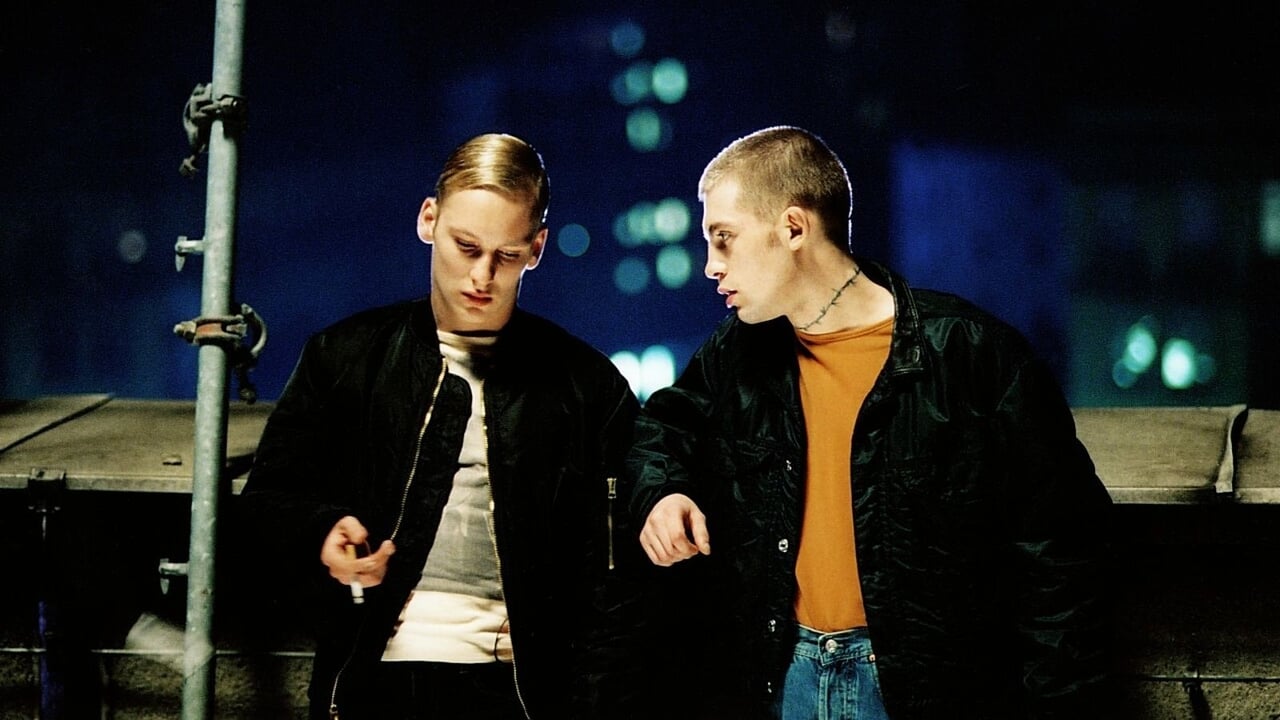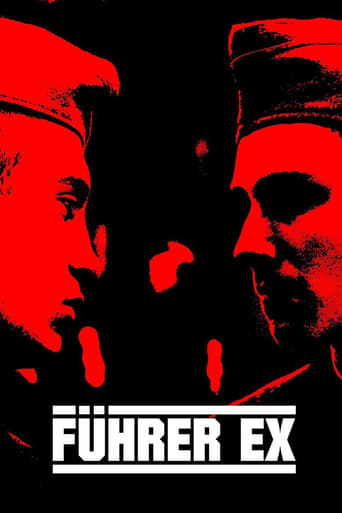

"Führer Ex" is certainly as baity as it gets and I guess they had success with that as this fairly mediocre movie is a lot more known than it really should be. Director here is Winfried Bonengel and he also adapted Ingo Hasselbach's autobiographic work for the screen. Still I think there is a reason why nobody from the cast really (with one exception, I come to that later) is in famous fames these days anymore and same also goes for Bonengel who went on to direct terrible television series after this project and none of the works he made before or after this one comes close to this one in terms of popularity.The movie runs for 100 minutes and tells us about the lives of 2 GDR citizens who are sick of their country and try to flee. However, instead of becoming respectable FRG citizens, they switch to the other side and end up on the far right. Most of the movie is about depicting what happens when they were in jail. Easily the best thing about this film is Dieter Laser, he is the one I was referring to previously as he is still well-known today. He plays a prison inmate who killed his wife and talks all about self-defense, but it becomes so obvious that this is not what happened. That scene, as brutal as it was, was also pretty hilarious because of Laser's insane line delivery. Sadly, the rest of the film is almost in its entirety forgettable and there are very few memorable moments. Even the ending does not feel authentic, but just dramatic for the sake of it. I do not recommend this film.
... View MoreThe story of the rise and redemption of a neo Nazi leader in Germany, this movie lacks the emotional depth when compared to American History X.We first see the two characters of Heike and Tommy as miscreants in the waning days of Communist East Germany. Typical of many youths of the era they know that the state ideology rings hollow, and spend their days committing minor acts of vandalism and drinking beer.A minor run in with the law lands Tommy in prison, and upon his return the two hatch a scheme to escape to the west. The plot fails, and they end up in the slammer.The first part of the movie was pretty good. We see Heiko as a rather naive and well meaning kid, albeit one without much of a backbone. His mother has a rather distant relationship with him, and we see a rather interesting rotation of her male visitors throughout the movie. Unfortunately the film does not really touch upon his feelings on that matter much. Heiko hooks up with a rather wild girl, whose impulsive behavior causes some problems, but he seems to be rather quick to move past the situation.The character of Tommy is much stronger than that of Heiko. We see he's the more daring of the two, but at the same time has much more strength to his personality than Heiko. Tommy is bad because he wants to be, whereas Heiko is just along for the ride.Their stay in prison opens the second act of the movie, and here is where the movie hits its peak, and quickly deflates. Prison in East Germany is no different than anywhere else, with the usual plot elements. Heike ends up joining the Nazis for protection, while Tommy manages to escape to the west.And here is where the movie completely falls apart.We cut to Tommy returning to East Berlin after the fall of the wall, where he encounters Heiko leading a Nazi rally. Tommy rejoins the movement, and he is somewhat bothered at Heiko's attacks against the Turks and other enemies. There is a death, and the disenchanted Tommy abandons the movement. Heiko is sent out to remove the traitor, and the movie reaches its somewhat predictable finale.The movie has Acts I, II, and IV, but act III is missing. We have the set up of the story in the first part, the experience of Tommy and Heiko in prison, and then cuts to them reuniting outside of prison. I wanted to see Act III, what happens to Heiko after Tommy escapes, how his indoctrination into the Nazi philosophy takes place, his release from prison, his adjustment to the new Germany, his relationship with his girlfriend and mother as this goes on, etc.Instead we practically cut from Heiko walking funny in prison to Heiko torching a kebab stand. Before and after works well for diet commercials, but not movies of this sort. The whole point is the process of transformation, and for some reason the director chose to omit this. In American History X this is accomplished through the prison narrative from Derek to Danny. We miss that part here.That being said, there are a few reasons to see this film. The character of Tommy is well played, Aaron Hildebrand bearing a striking resemblance to Freddie Prinze Jr, which makes it kind of fun to watch. The setting is pretty interesting as well, a time and place gone by. But overall this movie is missing that certain something to make it rise above mediocrity. To non-German audiences this might be worth while to watch for the sheer novelty value, but if you're looking for some emotional depth to a film, American History X is much better in that department.
... View MoreFührer Ex is a challenging, harsh, and intensely involving tale of the course of friendship of two young lads living in the 'prison' of Communist East Germany in 1986. Based on fact (Ingo Hasselbach's book 'Die Abrechnng' adapted for the screen by Douglas Graham and director Winfried Bonengel), this story relates the changes that occur in the close friendship of two boys torn by the confinement of the East German Communists vs the Western freedom of West Germany and the countries not under Communist control. It informs us about that transition with the fall of the Berlin wall and the subsequent adjustment to the new form of life East Germans found beyond the crumbled wall.Heiko (Christian Blümel) is fair-haired, virginal, nice guy who longs for adventure (and more) with his idolized friend Tommy (Aaron Hildebrand), an edgy guy unafraid to get into a bit of trouble (Tommy is arrested for a minor crime and is released from jail shaved and tattooed). The two dream of escaping their rigid lives and fleeing to Australia. Tommy talks Heiko into running the risk of actual escape and together they break through the wires and walls that confine them but are apprehended in their attempt and sentenced to prison in a cruel Communist prison where they are separated, Tommy joining a 'neo-nazi' group and Heiko falling under the 'protection' of a fellow prisoner who eventually rapes him. The two finally are able to talk and plan a mutual escape, hopefully placing themselves in boxes to be transported to freedom. Tommy succeeds; Heiko doesn't and remains in prison.Flash forward to 1989 and the Berlin wall is down. Tommy is living a comfortable life in the new Berlin and encounters Heiko in a true Neo-Nazi meeting that Heiko is leading. The tables have turned - Heiko is the miscreant and Tommy is the good guy. Convinced that Tommy is a traitor to the ideals of Heiko's political interests, Heiko surfaces all of the hate that brewed in prison and is focused on unjust governments. An event occurs that alters their friendship and Heiko is forced to see that varying political climes and convictions pale in the value of treasured friends.The film is well paced and the acting is excellent. There are gaps in the script storyline that result in some confusion for the viewer, but the overall impact of the 'biopic' nature of the movie is powerful and deserves attention. It is particularly fitting that this film comes out of Germany, as though it may be a purging of sorts over the initial division of East vs West Berlin. And forgetting about the political aspects of the story, this is a powerful document on the importance of commitment to long-term friends. Recommended. Grady Harp
... View MoreMy title above really says it all.The film is as outstanding as is "American History X." The young lead is also. As was Edward Norton of course. The theme is very similar, and just as well developed... Characters include the older man with Neo-Nazi ideas leading young people with little or no father figures stray, the protected or protective brother figure, the strong mother figure, the jail scenes with all the violence to be expected. The list of parallels is endless.Yes, you may have seen it all before. But this flick is worthwhile. Face it - the topic perhaps does belong more to Berlin (need I say it -the birth place of Neo-nazism) than to Los Angeles. And the Germans have finally made a film about a culture they originated, which is outstanding in many ways.The inside look at the old GDR (East Germany) is very informative, and well told to non-Germans. Germans may think otherwise of this recurring "East German" theme, a staple plot setting in German cinema for the last 12 years with no end in sight. But even if that is old to you, there is so much to appreciate in the movie that it will not disappoint. Certainly, the lead performance by the Berlin teenager (age at the time of filming anyway) is chilling, and impactful. We watch, accompany and feel his transformation intimately. In my last comparison with "American History X," I assure you the lead in this movie is every bit as dense and intense as Edward Norton was.Too bad it has not been shown (yet, perhaps) to more international audiences. I saw it in late October 2002 at the São Paulo Film Festival. I do definitely recommend it (my rating 10/10). See this one on the big screen when it comes your way.
... View More